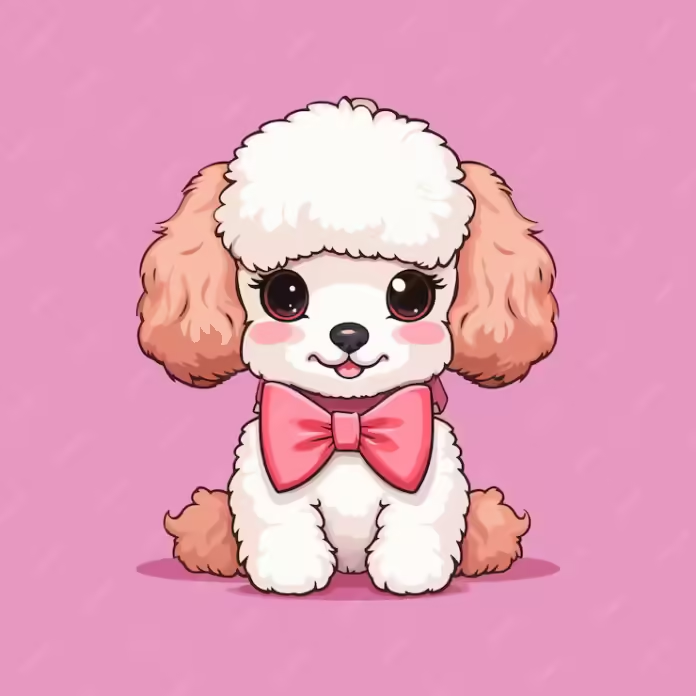Introduction to Toy Poodles
Among the pantheon of beloved canine companions, toy poodles stand out for their intelligence, charm, and elegance. Originating from the larger standard poodle, toy poodles have captured hearts worldwide with their delightful demeanor and manageable size. Their history is as rich as their curls, tracing back to Germany, with the word “poodle” deriving from “pudel,” meaning “to splash in water.” Known for their agility and prowess in retrieving, these miniaturized versions were popularized by French nobility as cherished companions.
The allure of toy poodles is not just skin deep. These little dynamos are renowned for their keen intellect, making them one of the most trainable breeds. Their affectionate nature makes them excellent companions for those who understand and appreciate their vivacious spirits. With a typical weight of about 4-6 pounds and a height of up to 10 inches, toy poodles are ideal for pet owners seeking a small yet spirited friend. Their coat, curly and dense, is hypoallergenic, making them suitable even for those with mild allergies.
Their distinctive personality traits—playfulness, curiosity, and a hint of mischief—make toy poodles endlessly endearing. Each toy poodle possesses a unique blend of characteristics that ensure they stand out among canine companions. From their undeniable intelligence to their delightful antics, this breed continues to charm its way into households and hearts across the globe.
Health and Care Tips
Caring for a toy poodle involves understanding their specific needs, particularly regarding their health. Their coat requires regular grooming to prevent matting and keep it looking its best. Regular brushing, at least several times a week, is essential to maintain the texture and shine of their fur. Professional grooming every six to eight weeks is also recommended to ensure a neat appearance and healthy skin.
Diet plays a crucial role in maintaining the health of toy poodles. These active little dogs require a balanced diet rich in proteins, vitamins, and minerals. Portion control is vital, given their small size and propensity towards obesity. Owners should consult with a veterinarian to devise a diet plan that suits the specific needs of their poodle. Fresh water should always be available to keep them hydrated and healthy.
Exercise is another vital component of toy poodle care. Despite their diminutive size, toy poodles are energetic and require regular physical activity. Daily walks along with interactive playtime can help burn off energy, keeping them fit and mentally stimulated. Regular vet check-ups are crucial to monitor for common health issues such as hip dysplasia, eye problems, and patellar luxation, ensuring a long, happy life for your toy poodle.
Training and Socialization

Training a toy poodle can be a rewarding experience due to their innate intelligence and eagerness to please. Begin training early with basic commands like sit, stay, and come. Consistency, patience, and positive reinforcement are key to successful training. Using treats and praise can motivate toy poodles to learn new skills quickly.
Socialization is equally important to ensure that toy poodles are well-adjusted and confident in various situations. Expose them to different environments, people, and other animals from an early age to prevent shyness or anxiety. Enrolling in puppy socialization classes can provide structured opportunities for interaction and learning.
Engaging their intelligent minds with puzzle toys and training exercises can also help prevent boredom, which can lead to undesirable behaviors. Regular interaction and mental stimulation will keep your toy poodle happy and well-behaved. Remember, a well-trained and socialized toy poodle is a joy to have as a companion, enriching the lives of their owners with their delightful presence.
Toy Poodle as a Family Pet
Toy poodles excel as family pets, thanks to their affectionate and gentle nature. They form strong bonds with their human families and enjoy being involved in daily activities. Their small size makes them suitable for apartment living, but they thrive in homes where they receive ample attention and love.
Children and toy poodles can be a delightful combination, provided interactions are supervised. Teach children to handle toy poodles gently and respectfully to foster a positive relationship. This breed’s playful nature and love for games make them excellent playmates for kids, contributing to a harmonious household dynamic.
When it comes to other pets, toy poodles generally do well, but introductions should be done gradually and carefully. Their friendly disposition allows them to coexist peacefully with other dogs and even cats. With proper introductions and training, toy poodles can become integral members of multi-pet households, bringing joy and companionship to all.
Toy Poodle Community
Joining a community of fellow toy poodle enthusiasts can enrich your experience as an owner. Numerous online forums and social media groups provide platforms for sharing tips, stories, and experiences. These communities offer valuable insights into toy poodle care, training, and health, creating a supportive network for new and experienced owners alike.
Offline, local dog clubs and meet-up groups can provide opportunities for socializing and bonding with other toy poodle owners. Attending events and gatherings allows both you and your poodle to make new friends and learn from the experiences of others. These interactions can enhance your understanding of the breed and provide a sense of belonging within the toy poodle community.
Many breeders and rescue organizations also host events that celebrate toy poodles and their unique charm. Participating in these events can deepen your appreciation for the breed and create cherished memories with your furry friend. Whether online or offline, engaging with the toy poodle community can be a rewarding experience that strengthens your bond with your pet.
Conclusion
Toy poodles bring joy, intelligence, and a touch of elegance to any household. Understanding their history, health needs, and training requirements ensures a fulfilling relationship for both the poodle and their owner. By providing proper care, socialization, and love, toy poodles can become cherished companions who enrich our lives with their vibrant personalities.

